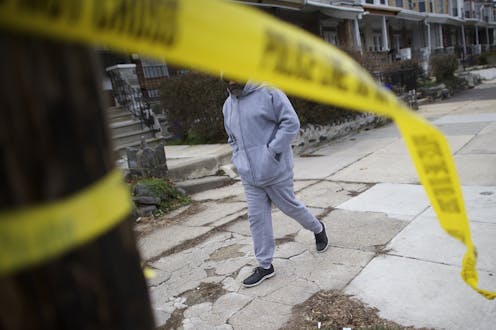More guns, pandemic stress and a police legitimacy crisis created perfect conditions for homicide spike in 2020
- Written by Justin Nix, Associate Professor of Criminology and Criminal Justice, University of Nebraska Omaha

Homicides in the U.S. spiked by almost 30%[1] in 2020.
That was the main takeaway from figures released on Sept. 27, 2021, by the FBI[2] that showed almost uniform increases across America in the murder rate.
The fact that big cities, small cities, suburbs and rural areas – in both blue and red states – experienced similar increases in homicides suggests that nationwide events or trends were behind the rise.
The COVID-19 pandemic would be one obvious explanation given its pervasiveness in 2020. But as a criminologist[3], I know that[4] homicide rates are affected by a number of factors. And what happened in 2020 was a confluence of events that created the perfect conditions for a spike in murders.
Stress and a lack of support
COVID-19 likely did have an impact. People were under increased psychological and financial pressure during the pandemic. Criminologists have long pointed to “strain theory[5]” to explain criminal behavior. Stressors – such as unemployment, isolation and uncertainty about the future – can lead to increased frustration and anger. People experiencing these negative emotions are more prone to turn to crime when they lack access to more positive coping mechanisms. And previous research has shown how financial stressors and a lack of social support work together to influence the overall homicide rate[6].
But the pandemic wasn’t the only major event of 2020 that likely contributed to the increased homicide rates. In May of that year, George Floyd was murdered[7] by a police officer in Minneapolis.
Floyd’s murder and the large-scale protests that followed sparked a police legitimacy crisis[8]. In short, this means citizens’ trust in police was diminished[9].
The ‘Ferguson effect’
When trust in the police falls as dramatically as it did[10] following Floyd’s murder, the general public may become less likely to call 911 to report crimes or otherwise engage with the criminal justice system. Indeed, research by Desmond Ang at Harvard University suggests that after Floyd’s death, 911 calls dropped significantly[11] in the eight cities he and his colleagues studied.
High-profile cases of police brutality are also associated with what has become known as the “Ferguson effect,” in which police officers make fewer stops[12] that occasionally result in illegal guns being taken off the streets[13].
Research shows that a small number of people are disproportionately involved in violent crime[14]. If this small group felt emboldened as a result of the legitimacy crisis[15], then it might help explain the increase in homicides.
Richard Rosenfeld, a criminologist at the University of Missouri-St. Louis, cited the “Ferguson effect” as a factor[16] in the 17% hike in homicides recorded in U.S. cities[17] after Michael Brown was shot by a police officer in the Missouri city in 2014.
More guns = more gun homicides
There is also evidence that gun carrying increased[18] in 2020.
Crime analyst Jeff Asher[19] and data scientist Rob Arthur[20] found that in 10 cities, although police made fewer arrests in 2020, the number of gun seizures went up. This suggests more people were illegally carrying guns in 2020. And research has long confirmed that gun ownership is linked to higher rates of firearm homicides[21].
When there are more guns in the hands of emboldened offenders, then the likely result is more attempted and completed murders. That this all happened during the height of a pandemic means 2020 was a perfect storm of factors that proved capable of producing the largest single-year homicide spike on record.
[Get the best of The Conversation, every weekend. Sign up for our weekly newsletter[22].]
References
- ^ spiked by almost 30% (www.cnn.com)
- ^ figures released on Sept. 27, 2021, by the FBI (www.fbi.gov)
- ^ as a criminologist (www.unomaha.edu)
- ^ I know that (scholar.google.com)
- ^ strain theory (doi.org)
- ^ work together to influence the overall homicide rate (doi.org)
- ^ George Floyd was murdered (www.nytimes.com)
- ^ police legitimacy crisis (www.denverpost.com)
- ^ was diminished (doi.org)
- ^ falls as dramatically as it did (www.usatoday.com)
- ^ 911 calls dropped significantly (scholar.harvard.edu)
- ^ make fewer stops (papers.ssrn.com)
- ^ result in illegal guns being taken off the streets (media4.manhattan-institute.org)
- ^ a small number of people are disproportionately involved in violent crime (doi.org)
- ^ emboldened as a result of the legitimacy crisis (onlinelibrary.wiley.com)
- ^ as a factor (www.npr.org)
- ^ recorded in U.S. cities (www.ojp.gov)
- ^ evidence that gun carrying increased (www.vox.com)
- ^ Crime analyst Jeff Asher (twitter.com)
- ^ data scientist Rob Arthur (www.robarthurwriter.com)
- ^ linked to higher rates of firearm homicides (doi.org)
- ^ Sign up for our weekly newsletter (theconversation.com)
















